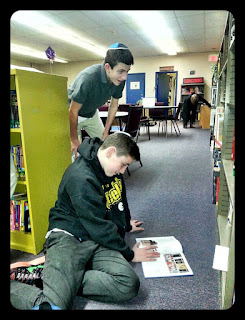(You can read about the Memphis Massacre at this website by Harper's Weekly.)
This year is the 150th anniversary of the Memphis Massacre, part of our city's troubled past during the Reconstruction period after the Civil War. Facing History and Ourselves held a local workshop on the event, which was attended by our Humanities teachers Ashley Brown and Rhonda Martin. Mrs. Brown then passed the experience on to her AP Language and Composition students.
The students read original testimony from the little-known event, then explored how society's ideas about important issues are altered when they are unaware of events in their own history. The students walked around the room to read original accounts of the massacre, then silently added their own comments. You can see some of their thoughts in the images below.
The students then learned about the rise of the Ku Klux Klan and read an essay by noted African-American author W.E.B. DuBois. Afterwards, the students composed their own thoughtful essays with the prompt, "The Importance of Getting History Right." Below is Junior Tani Finkelstein's response, which so impressed our school's Facing History and Ourselves representative that she asked permission to send it on to the organization's senior leaders.
The Importance of Getting History Right by Tani Finkelstein (Class of 2017)
History, by its very nature, is biased. It is a record of events from the past through the lens of certain people, and not others. No one is omniscient, all knowing, and unbiased except for God, and as such, any account of the past is going to biased and limited in certain ways. Some accounts, however, are significantly more biased and far from the truth than others. Regardless, all of these accounts influence and mold how we view the past. Since, of course, we were not there, we can only accept what we read and hear. In many instances, our understanding of history can effect how we think of people and how we will act in the future.
Take, for example, the well known historic work of Herodotus: Histories. We rely on it heavily as a source for much of Greek and Persian history, but in reality, much of it is completely made up and biased against Greek enemies. Yet, due to a lack of any other historical sources from that time, we use Herodotus' biased and often inaccurate account to frame our understanding of history. As a result, our understanding of much of that history is likely quite inaccurate. This illustrates perfectly how history can make us believe things which simply are not true, but yet, we cannot question it, because we were not there. However, some misrepresentations of history have much more wide and negative ramifications than others. It is not necessarily negative that we falsely believe that a Persian queen was a nasty, wicked woman who ate children, but in the accounts of more recent history, something like that can have massive repercussions. When a historian denies the Holocaust or warps the history of cruelty to blacks, for example, that has a big effect; it perpetuates baseless hatred and cultivates naively cruel perspectives and actions.
As they say, "those who don't learn history are doomed to repeat it." That phrase could not be more true. If we have a prideful and naive view of atrocious and terrible events of history, we are truly likely to repeat it. People think that the Holocaust and black slavery can never happen again, but they can, albeit in modern forms. In other words, the same hatred may manifest itself in more contemporary, seemingly more moral fashions, but as Solomon says in Ecclesiastes, "there is no new under the sun." It is our obligation and responsibility to get history right, learn from it, and ensure that there is new under the sun, that we can reach new horizons of morality and justice.
The work of an organization like Facing History and Ourselves is a perfect model for how history can be used so constructively. As obvious by the name, what they do is "face" and confront the blunt history of injustices committed in the world, and they facilitate constructive conversation between diverse segments of people on how to learn from that history, and not make the same mistakes in future generations. When we cover up that history in an effort to make ourselves look better, or to prevent regret and shame, we are doing a major disservice to society, depriving peoples' psyches from invaluable messages.
History is an amazing tool, when used properly. It is our obligation to ensure its accurate portrayal and constructive use towards creating a better, more just future.









